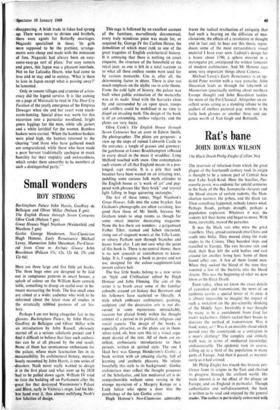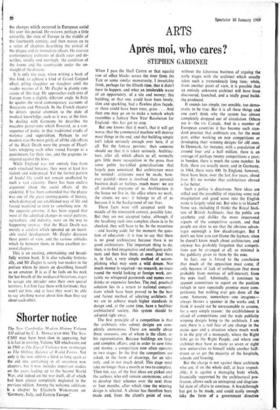Rat's bane
JOHN ROWAN WILSON
The Black Death Philip Ziegler (Collins 36s)
The reservoir of infection from which the great plague of the fourteenth century took its origin is thought to be a remote part of Central Asia near Lake Issyk-Koul. Here the bacillus, Pas- teurella pestis, was endemic for untold centuries in the body of the flea Xenopsylla cheopsis and the blood stream of certain rodents, the- Man- churian marmot, the jerboa; and the black rat. Then something happened, nobody knows -what. Perhaps floods, perhaps drought, perhaps a population explosion. Whatever it was,- the rodents left their home and began to mover With them, inevitably, moved the parasites. - It was the black rats who were the great travellers. They spread eastwards into China and south into India. They moved along the trade routes to the Crimea. They boarded ships and travelled to Europe. The rats became sick and died, their fleas left the cold bodies and cast around for another living host. Some of them found other rats. A few of them found men. When they sucked the blood of the men they vomited a few of the bacteria into the blood stream. This was the beginning of what we now know as the Black Death.
Even today, when we know the exact details of causation and transmission, the news of an epidemic carries a special terror of its own; it is almost impossible to imagine the impact of such a visitation on the pre-scientific thinking of the Middle Ages. Inevitably it was thought by many to be a punishment from God for man's wickedness. Others racked their brains to discover the method of transmission. Was it food, water, air? Was it an invisible cloud which passed over the countryside or a contagion in a man's clothing? The complex and unlikely truth was, in terms of mediaeval knowledge, undiscoverable. The epidemic took its course, killing up to a third of the population in many parts of Europe. And then it passed, as mysteri- ously as it had arrived.
Mr Philip Ziegler has traced this historic pes- tilence from its origins in the East and charted its progress through the civilised world. His main interest is in the effect of the plague on Europe, and on England in particular. Though authoritative and well-documented, the book is written to be read and enjoyed by the 'general reader, The author is particularly concerned with the changes which occurred in European social life over this period. He reviews, perhaps a little
cursorily, the state of Europe in the middle of the fourteenth century, and then moves on to a series of chapters describing the arrival of the plague and its immediate effects. He assesses contemporary estimates of death rates and de- scribes, vividly and movingly the condition of the towns and the countryside under the on- slaught of the disease.
It is only too easy, when writing a book of 'this kind, to achieve a kind of Grand Guignol effect, piling slaughter on slaughter until the reader wearies of it. Mr Ziegler is plainly con- scious of this trap. He approaches each area of Europe from a slightly different angle. In Italy he quotes the vivid contemporary accounts of Boccaccio and Petrarch. In the French chapter he directs special attention to the state of medical knowledge, such as it was, at the time.
In dealing with Germany he describes the macabre perversions which flowered, as a con- sequence of panic, in that traditional cradle of violence and superstition. Perhaps to our modern eyes the most grisly of all the side-effects of the Black Death were the groups of Flagel- lants whipping each other round Europe as a punishment for their sins, and the pogroms in- stigated against the Jews.
While England was not entirely free from such ritualised lunacies, they were at least less violent and widespread. Yet the formal pattern of feudal life could not remain unaffected by such a vast calamity. There has been endless argument about the social effects of the epidemic. It has been contended that the plague was one of the great turning-points of history, which destroyed our established way of life and forced mankind to turn to something new. At the opposite extreme, it has been argued that most of the admitted changes in social patterns, agriculture, and industry, were on the way to happening anyway —that the Black Death was merely a catalyst which speeded up an inevit- able social development. Mr Ziegler discusses these points of view, and the various attitudes which lie between them, in three excellent ter- minal chapters.
This is an exciting, entertaining and beauti- fully written book. It is also valuable historic- ally, and Mr Ziegler is surely too modest in the preface where he insists on describing himself as an amateur. It is as if he feels on his neck the hot breath of the mediaeval historians, eager to savage any intruder onto their own special territory. Let him face them with fortitude; they won't eat him, and at least they won't be able to say anything worse about him than they say about each other.



































 Previous page
Previous page